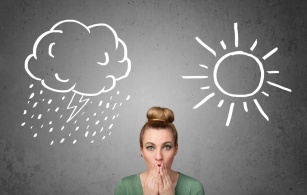
As much as 75 percent of the population sees a connection between their well-being and the weather. The decreasing pressure disturbs the work of the nervous system, the circulatory system, as well as the production of hormones. This hypersensitivity to atmospheric changes is called meteopathy.
Meteopathy always goes hand in hand with specific symptoms, but it is not classified as a disease entity. It can affect not only sick people, but also completely healthy people.
Weather versus meteopaths
During rainy, foggy, sultry days, i.e. when the low pressure subsides, and also during the first week of the high pressure, when the pressure remains at most 1020 hPa and the sun is still peeking out from behind the clouds, meteopaths feel especially good.
However, during a period of strong high pressure, with heat and pressure increase, when there are no clouds in the sky, or it is dry, frosty and sunny on winter days, the well-being deteriorates. As blood pressure rises, blood clotting increases, which makes us complain of irritability and headaches. Resigning from consuming products containing coffee or excess salt during this time may bring relief, as they contribute to high blood pressure.
The coming disputes low brings with it humidity, sometimes the days become sultry. The sky is covered with clouds. We fall into depressive states, we suffer from headaches and nausea, and although we feel exhausted, it is hard for us to fall asleep. On these types of days, we should go for a brisk walk in the morning, and eat carbohydrates for dinner, e.g. a pasta dish or a piece of cake. During the day we can support ourselves with coffee.
Initially, a warm front entails a large drop in atmospheric pressure, followed by an increase in pressure and temperature. We react with drowsiness, feeling broken, it is difficult for us to concentrate. The thyroid works slower during this time, and less hormones are produced. It is recommended to engage in any kind of physical effort.
The sky becomes cloudy, the temperature drops, we can expect wind, storm and rain or snow. The cold front greets us with migraines and headaches, a sense of anxiety and irritability that result from the increased production of adrenaline. Herbal infusions and relaxation exercises should anesthetize these feelings.
How to fight the symptoms of hypersensitivity?
Hypersensitivity to atmospheric changes may manifest as headaches, muscle and joint pains, difficulties in taking a fresh breath, stomach ailments, increased sweating, fatigue, irritability and problems with concentration.
- A cold shower may be helpful in combating these ailments.
- Brushing your body with a natural bristle brush will dilate blood vessels and soothe your body.
- Ask your partner to massage the area between the 7th and 8th vertebrae. This is the so-called chinese weather point.
- Try to relax, plan your duties so that they do not overlap. It will save you unnecessary stress.
- At the beginning of the day, prepare a cocktail: mix 4 apricots with a tablespoon of oat bran, pour the mixture with a glass of fresh carrot juice.









